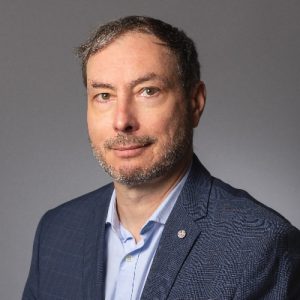
Hervé Debar named Vice President of Telecom SudParis
On November 16 2021Article updated on February 12, 2025, to reflect the latest information.
Hervé Debar, director of research at Telecom SudParis, cybersecurity expert and member of the Scientific Board for the National Cybersecurity Agency of France (ANSSI), was named the school’s Vice President in May 2021. Here, he explains his ambitions for the university.
What are your priorities for Telecom SudParis as Deputy Dean?
Hervé Debar: One of my number-one missions is to give visibility to the tracks we offer to engineering students, with regards to employers and our partners. The school has defined its research priorities according to its positioning, capacities for action and the socio-economic demand: students, labour market, supervisors. Three areas of research outline the identity of Télécom SudParis.
The first, cybersecurity, is a field of research that is already well-established at the school. This theme is supported by a national-level strategy and the cybersecurity campus created in Palaiseau. The cybersecurity track is a way to enrich the general engineering course. It is essential to understand all aspects of IT well before getting into cybersecurity training. This specialisation has more and more applications in specific sectors, such as energy, automotive, transport, health, banking and insurance. All these areas use digital technology and are increasingly targeted by cyber-attacks. They are therefore seeking general engineering profiles with a specialisation in cybersecurity.
The second field of research is digital health. Research in this area is already well-developed at the school. Around 15 researcher-lecturers have been working on subjects connected to e-health for several years now.
There has been significant development in the area of smart medical devices. As well as equipment used in hospitals, such as scanners and MRI machines, we now have more lightweight devices (such as smart beds, insulin pumps and syringes). The rise in home care and remote consultations means we need new smart medical devices.
Télécom SudParis has built strategic partnerships with Genopole and Centre Hospitalier Sud Francilien. A “health” track is also available for future engineering students, in order to build skills in the area of digital health for those who wish to work in the medical world.
The third field of research relates to digital technology and the environment. Although these themes already exist at the school, particularly through research into the energy consumption of processors and RAM, we want to develop this field and offer training on the impact of digital technology on the climate, the energy consumption of digital technology, optimising the functioning of networks and computers to limit their carbon footprint, remote working and optimising travel. We will also offer students training on corporate social responsibility (CSR).
What are your ambitions for students?
D.: At Institut Polytechnique de Paris, we are creating the “PhD track”. It’s a personalised support programme for Master’s students. Researchers and researcher-lecturers guide students in choosing classes and help them to create their PhD project. This makes the PhD a next step following on smoothly from the Master. The idea is to facilitate the PhD experience for students by helping them better prepare during the Master and choose a project in advance. With this track, students take a more active role in defining their project, which represents an advantage in terms of developing autonomy. Scholarships will be awarded, as early as the Master’s, for the most promising projects.
And for faculty members?
D.: My aim is to support faculty members, particularly younger ones, towards funding that encourages scientific excellence like those awarded by the French National Agency for Research (ANR) or the European Research Council (ERC) programme.
At present, three of our researchers have received ANR funding for the relevance of their research. This funding assists with recruiting PhD students and accelerates the process of obtaining authorisation to direct research. We wish to help other researchers find unique research topics and support them towards European funding.
How do you plan to increase the visibility of the school and its programmes?
D.: Telecom SudParis has a well-established reputation for cybersecurity. We would like to develop schemes, like in Japan, where professionals from various sectors (energy, transport, health, etc.) meet in a trusted setting to discuss their cybersecurity problems and thereby help knowledge progress.
Sector-specific centres of expertise of this kind are starting to develop at the European level. Inter-sector schemes could also be created. For example, systems that distribute train tickets are regularly targeted by cyber-attacks. The same technology is used in bank ATMs. Responses to attacks used by the banking sector could therefore be of interest to the rail sector. It would be interesting to set up opportunities to exchange practices.
The visibility of the digital technology and the environment programme will be based on the “digital engineering & environmental transition” teaching chair, to inform our students and partners about our courses. As for the area of digital health, it would be interesting to roll out one or two representative initiatives to draw attention to our projects. The qualified students that we attract contribute to strengthening the school’s reputation and visibility.
What will success look like in your new role?
D.: It will be connected to improving visibility around our range of courses in the areas of cybersecurity, e-health, and digital technology and the environment for various audiences: students, companies and partners.
Obtaining prestigious funding, such as from ERC, would be a strong indicator of the success of our projects. We will continue to develop research activities that are recognised by publications, partner research projects, patents, and transfers of technologies and skills.
Interview by Annick de Chenay






